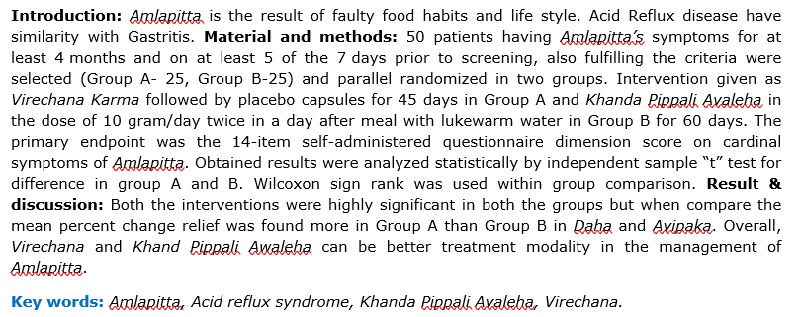Randomized parallel group clinical trial to evaluate the efficacy of Virechana Karma and Khanda Pippali Avaleha in Amlapitta
DOI:
https://doi.org/10.21760/jaims.v6i01.1174Keywords:
Amlapitta, Acid reflux syndrome, Khanda Pippali Avaleha, VirechanaAbstract
Introduction: Amlapitta is the result of faulty food habits and life style. Acid Reflux disease have similarity with Gastritis. Material and methods: 50 patients having Amlapitta’s symptoms for at least 4 months and on at least 5 of the 7 days prior to screening, also fulfilling the criteria were selected (Group A- 25, Group B-25) and parallel randomized in two groups. Intervention given as Virechana Karma followed by placebo capsules for 45 days in Group A and Khanda Pippali Avaleha in the dose of 10 gram/day twice in a day after meal with lukewarm water in Group B for 60 days. The primary endpoint was the 14-item self-administered questionnaire dimension score on cardinal symptoms of Amlapitta. Obtained results were analyzed statistically by independent sample “t” test for difference in group A and B. Wilcoxon sign rank was used within group comparison. Result & discussion: Both the interventions were highly significant in both the groups but when compare the mean percent change relief was found more in Group A than Group B in Daha and Avipaka. Overall, Virechana and Khand Pippali Awaleha can be better treatment modality in the management of Amlapitta.
Downloads
References
Mishra SS, Gupta AK, Panja AK, Meena KL. An analytical review of Amlapitta in the purview of changing lifestyle. Ayurpharma Int J Ayurveda Allied Science. 2012 Dec, 29:1(8):172-178.
Madhava Nidana, Amlapitta nidanam, 51/1-2. Available from: http://niimh.nic.in/ebooks/madhavanidana (Accessed on 1 October 2020)
El-Serag H, Talley N.The prevalence and clinical course of functional dyspepsia. Alimentary Pharmacology and Therapeutics. 2004 March, 11;19(6):643-654.
Abid S, Siddiqui S, Jafri W. Discriminant value of Rome III questionnaire in dyspeptic patients. Saudi Journal of Gastroenterology. 2011 Mar-Apr;17(2):129-33.
Shah SS, Bhatia SJ, Mistry FP.Epidemiology of dyspepsia in the general population in Mumbai. Indian J Gav stroenterol. 2001May-Jun; 20(3):103-6.
Bhatia SJ, Makharia GK, Abraham P, Bhat N, Kumar A, Reddy DN, et al. Indian consensus on gastroesophageal reflux disease in adults: A position statement of the Indian Society of Gastroenterology. Indian J Gastroenterol. 2019 Oct; 38(5):411-440.
Vaidya Shri Laxmipatisashtri, Yogratnakar, Reprint Edition 7th, Chukhamba Prakashan, Varanasi 2015, Amlapitta nidanam verse 1-5 pg no. 241-242
Kaviraajshri Ambikadutt Sastri, Brahmashankar Mishra, Bhaisjya Ratnavali, Edition 18th, Chukhamba Prakashan, Varanasi 2007, Chapter 56 verse 153 Pg no. 931.
Sri Yadu nandan Upadhyay, Madhava Nidana, Reprint Edition 13th, Chaukhamba Prakashan, Varanasi 2009, chapter 51 verse1-2 Pg no. 202
Charak Samhita, Chikitsasthana, Grahnidosha chikitsitam adhyaya, 15/42-44. Available from: http://niimh.nic.in/ebooks/echarak (Accessed on 5 October 2020)
Pandit Hemraja Sharma, Kashyapa Samhita, Khila Sthana, Reprint Edition 3rd, Chaukhamba Sanskrit Series Office,Varanasi 2008, chapter 16 verse 7-13 Pg no. 335
Vaidya Shri Laxmipatisashtri, Yogratnakar, Reprint Edition 7th, Chukhamba prakashan, Varanasi 2015, Amlapitta nidanam verse 1-2 pg no. 239
Sharma P.C, Yelne M.B, Dennis T.J. Database on Medicinal Plants Used In Ayurveda, Volume 3. New Delhi: Central Council for Research in Ayurveda and Siddha (Ministry of health & family welfare, department of ISM&H., G.O.I.); 2001.
Krishan Chandra Chunekar. Bhavprakash Nighantu. Reprint Edition 1st. Ganga sahay Pandey, editor. Varanasi: Chaukhambha Bharti Academy; 2018, Ikshu varga verse 29 Pg no. 780.
Al-Rehaily A, Al-Howiriny T, Al-Sohaibani M, Rafatullah S. Gastroprotective effects of ‘Amla’ Emblica officinalis on in vivo test models in rats. Phytomedicine. 2002 January 01;9(6):515-522.
Krishan Chandra Chunekar. Bhavprakash Nighantu. Reprint Edition 1st. Ganga sahay Pandey, editor. Varanasi: Chaukhambha Bharti Academy; 2018, Ghrita varga verse 4-6 Pg no. 758.
Bhatnagar M, Sisodia S. Antisecretory and Antiulcer Activity of Asparagus racemosus Willd. Against Indomethacin Plus Pyloric Ligation-Induced Gastric Ulcer in Rats. Journal of Herbal Pharmacotherapy. 2006;6(1):13-20.
Sailja srivastva, Jiwan prada- commentary on Sharanghdhar Samhita, Reprint Edition 1st, Chaukhamba Orientalia, Varanasi 2013, Chapter 4 verse 1-2 Pg no. 30.
Charak Samhita, Chikitsasthana, Jwarachikitsitam adhyaya, 3/171. Available from: http://niimh.nic.in/ ebooks/echarak (Accessed on 5 October 2020)
Charak Samhita, Siddhisthana, Kalpanasiddhi adhyaya, 1/17-18. Available from: http://niimh.nic.in/ebooks/echarak (Accessed on 5 October 2020)















